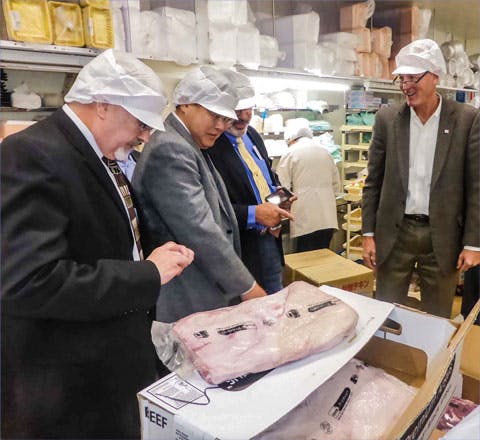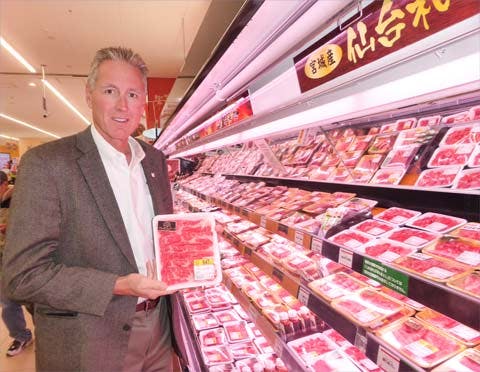USMEF Arranges Japan Visit for Iowa Trade Delegation
USMEF’s Tokyo office recently hosted a 20-member delegation led by Iowa Gov. Terry Branstad and including leaders from Iowa’s meat and agriculture industry, providing them with an opportunity to meet industry partners in Japan who purchase U.S. beef and pork.

Members of the Iowa delegation tour a cold storage facility in Tokyo
USMEF used its close relationships with importers to arrange meetings with top management officials from Nippon Ham and Ito Ham, the country’s No.1 and No. 2 meat companies, respectively. USMEF also supported an Iowa Governor’s Reception, where most of the guests were key meat industry representatives invited by USMEF.
On the delegation’s final day in Japan, USMEF gathered members from the Iowa Pork Producers Association (IPPA), Iowa Beef Industry Council (IBIC), Iowa Corn Promotion Board and Iowa Soybean Association for a Japanese market briefing at the USMEF office. The group then visited Japanese retailers Summit and Tokyu (Central Foods) to see U.S. pork and beef promotional efforts.
“It was a great opportunity for pork and beef producers to visit Summit and Tokyu outlets to not only see the promotions but also exchange information with our trading partners,” said Takemichi Yamashoji, USMEF director in Japan.

Dean Black, an Iowa Beef Industry Council board member, views U.S. beef presentations on a Tokyo retail visit
Central Foods was so impressed with the visit that they posted photos on the company’s Facebook page and noted, “Today, 13 Iowa producers visited our store. We conducted Iowa Premium Beef promotions and the Iowa team was very satisfied with our presentation.”

The Iowa delegation poses for a photo at Ito Ham, Japan’s second-largest meat company, during a meeting arranged by USMEF
At the Governor’s Reception, held at the U.S. Embassy in Tokyo, Branstad recalled the beginning of the trade relationship between Iowa and Japan.
“As you may know, Iowa and Yamanashi’s sister state relationship stems back to 1959, when a typhoon devastated Yamanashi Prefecture,” he told the audience. “In response, Iowa sent 35 breeding hogs and 100,000 bushels of corn to help with the recovery - an event that is famously known today as the 'Iowa Hog Lift.' We are eager to not only follow up on the foundations we have laid in the past, but to also explore both new trade and investment opportunities.”
According to the Iowa Economic Development Authority, Japan is Iowa’s leading export market for pork and beef products. Iowa companies exported $564 million in meat products to Japan in 2015.
Al Wulfekuhle, president of the IPPA, said Japan is an “important destination for Iowa’s pork products, so it was important to meet our customers.”
Yamashoji said Japan’s food industry was able to learn a lot about Iowa beef and pork production during the two-day visit.
“As many in the U.S. meat industry have learned from visits to Japan or from hosting Japanese trade teams back home, meeting face-to-face is important to Japanese business people,” he said. “Also important are the stories from the U.S. on how pork and beef is produced, packed and shipped. The Japanese want to know where their food comes from, and these sorts of visits and meetings help answer that question.”
The group began its trade mission to Asia with a stop in China, where they met with officials in Beijing and Hebei, Iowa’s sister state. In a press release, Chris Freland, executive director of the IBIC, said the mission came at a critical time because China recently announced its intention to end a 13-year ban on imports of U.S. beef.
“We want to be a partner in that game,” said Freland. “China is a fifth of the world population, so that makes for a great market opportunity with our beef products. We are cautiously optimistic.”
